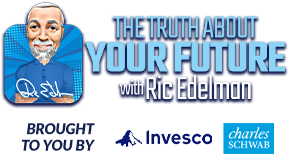The Silent Titan of Tech
How an unseen but ever-present technology is powering scientific breakthroughs
Ric Edelman: It's Tuesday, November 14th. AI, as we all know, is revolutionary and it's revolutionizing science. It really shouldn't be all that surprising. Tech has always revolutionized science. Remember microscopes and telescopes? They came onto the scene in the 1600s. The telegraph in the 1850s. Aircraft in the 1900s. The internet in the 1990s. All these led to major progress in astronomy, physics, and eventually into the business world - fertilizers, pharmaceuticals, the transistor. And so now the latest is AI.
Last year, AI was mentioned in 7% of all physics and astronomy papers. It was even cited in 1% of papers in veterinary medicine. This year, every scientific field is reporting research using AI. At MIT, they found new antibiotics using AI. Researchers at the University of Liverpool used AI to create a new material for the production of batteries. A biochemist at the University of Oxford used AI to find the protein in mosquitoes that transmits malaria. Another team needed just 30 days to use AI to find the protein involved in liver cancer.
Climate scientists are using AI to predict the weather a week in advance, thousands of times faster and cheaper than the old technology with no drop in accuracy. Physicists are using AI to figure out how to create nuclear fusion. A psychologist at the University of Waterloo is using AI for focus groups instead of real human participants, and software coders are working 55% faster by using AI.
You might want to think about the Global X Artificial Intelligence and Technology ETF. The symbol is AIQ. Grandview Research says the global AI boom could grow tenfold by 2030, and the Marketing AI Institute says AI is going to boost corporate profits by 38%. Accenture says AI is going to add $14 trillion to the GDP by 2035.
So the Global X ETF, the Global X Artificial Intelligence and Technology ETF, invests in companies worldwide, both household names and newcomers that invest in information technology, communications services, consumer discretionary, industrial stocks, financial stocks, health care stocks. Yeah I stuttering pretty much everything. And AIQ is an opportunity for you to be part of it. You can learn more about this ETF at Global X ETFs.com. If you're an investor, talk to your financial advisor about it.
Let me switch gears now. Bitcoin's been around since 2009 and we don't have a bitcoin ETF, at least not yet. But there are applications in front of the SEC any day now. The SEC may very well approve one or more of these bitcoin ETF applications. It's coming soon. You don't have a lot of time to wait. You need to get the knowledge you need right now about crypto, so that you're prepared and ready to help your clients when these ETFs enter the market. Your clients are going to call you asking you for your opinion. You need to demonstrate to them that you've gotten that knowledge, and there's only one way for you to do it. Get your CBDA to become certified in blockchain and digital assets. It's offered by DACFP, the Digital Assets Council of Financial Professionals. It's online self-study and self-paced. It's listed in FINRA's database of professional designations, just like the CFP®, the CFA, the CLU, and the ChFC. You need to serve your clients. You also need to build your practice, and the CBDA designation will help you do both. Enroll today and get your CBDA designation.
-----



